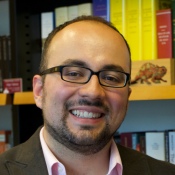January 6, 2017 — 3:00–7:00pm
Kislak Center for Special Collections, Van Pelt Library
University of Pennsylvania, 3420 Walnut Street
[Add to your calendar through our Facebook event page]
Description
The expansive contours of the Iberian world in the 16th and 17th centuries, expressed in the imperial motto plus ultra or “further beyond,” can at times obscure the aporias (of ecologies, ethnicities, and epistemologies) at its fringes. Recent scholarship on the material cultures, political economies, and discourses of gender of imperial Spain has worked to address these gaps and contradictions. Responding to the MLA 2017 presidential theme of Boundary Conditions, this afternoon symposium gathers students and scholars of the early modern Iberian world for interdisciplinary roundtable discussions that aim to bring forth the spaces, bodies, and practices that exceeded—and in doing so, defined—the limits of this ostensibly “boundless” empire.
Program
3:00–3:30 — Coffee & Refreshments
3:30–4:30 — Session 1: Mare nostrum / Terra ignota — Mónica Domínguez Torres (Delaware) chair
Panelists: Christina Lee (Princeton), Miguel Martínez (Chicago), Ricardo Padrón (Virginia), Sherry Velasco (USC)
4:30–4:45 — Break
4:45–5:45 — Session 2: Corpus delicti / Hortum deliciarum — Nicole D. Legnani (Princeton), chair
Panelists: Israel Burshatin (Haveford), Jill Ross (Toronto), Felipe Valencia (Utah State), Sonia Velázquez (Indiana)
6:00-7:00 — Reception @ Zavino University City, 3200 Chestnut St.
Participants
 Israel Burshatin is Professor of Spanish and Comparative Literature at Haverford College. His research focuses on discourses of “Orientalism,” religion, and on the articulations of gender, sexuality, and race in Medieval and early modern Spain. His current project is concerns the poetics of biopower, and traces the emergence of subjects empowered or subdued by the government of life, from captives in Alfonsine law to medical representations of bodies of pleasure, illness, and disorder.
Israel Burshatin is Professor of Spanish and Comparative Literature at Haverford College. His research focuses on discourses of “Orientalism,” religion, and on the articulations of gender, sexuality, and race in Medieval and early modern Spain. His current project is concerns the poetics of biopower, and traces the emergence of subjects empowered or subdued by the government of life, from captives in Alfonsine law to medical representations of bodies of pleasure, illness, and disorder.
 Mónica Domínguez Torres is Associate Professor and Director of Undergraduate Studies at the Department of Art History, and Director of Latin American and Iberian Studies at the University of Delaware. Her book Military Ethos and Visual Culture in Post-Conquest Mexico, investigates military images and symbols in sixteenth-century Mexico, showing how interconnections between martial, social and religious elements resonated with similar intensity among Mesoamericans and Europeans.
Mónica Domínguez Torres is Associate Professor and Director of Undergraduate Studies at the Department of Art History, and Director of Latin American and Iberian Studies at the University of Delaware. Her book Military Ethos and Visual Culture in Post-Conquest Mexico, investigates military images and symbols in sixteenth-century Mexico, showing how interconnections between martial, social and religious elements resonated with similar intensity among Mesoamericans and Europeans.
 Christina Lee is a tenured research scholar in the Department of Spanish and Portuguese at Princeton University. Her publications include: The Anxiety of Sameness in Early Modern Spain, the collection of essays Western Visions of Far East in a Transpacific Age, and Reading and Writing Subjects in Medieval and Golden Age Spain: Essays in Honor of Ronald E. Surtz (with José Luis Gastañaga). Her current book project examines the sacred world of the Spanish Philippines during the early colonial period.
Christina Lee is a tenured research scholar in the Department of Spanish and Portuguese at Princeton University. Her publications include: The Anxiety of Sameness in Early Modern Spain, the collection of essays Western Visions of Far East in a Transpacific Age, and Reading and Writing Subjects in Medieval and Golden Age Spain: Essays in Honor of Ronald E. Surtz (with José Luis Gastañaga). Her current book project examines the sacred world of the Spanish Philippines during the early colonial period.
 Nicole D. Legnani is Assistant Professor of Colonial Latin American Studies at Princeton University, where she writes on the intersection between venture capital, the laws of peoples, and theology in the conquest of America in the long sixteenth century, the subject of her book manuscript, Trading Fictions: Love, the Law and the Enterprise of Spanish Conquest in the Americas. Her second project, Madness and Civilization from Below, concerns insurgency and heresy in the Viceroyalty of Peru.
Nicole D. Legnani is Assistant Professor of Colonial Latin American Studies at Princeton University, where she writes on the intersection between venture capital, the laws of peoples, and theology in the conquest of America in the long sixteenth century, the subject of her book manuscript, Trading Fictions: Love, the Law and the Enterprise of Spanish Conquest in the Americas. Her second project, Madness and Civilization from Below, concerns insurgency and heresy in the Viceroyalty of Peru.
 Miguel Martínez is Assistant Professor of Spanish at the University of Chicago, where his research describes the cultural and literary histories of early modern Iberia and colonial Latin America. He is the author of Front Lines: Soldiers’ Writing in the Early Modern Hispanic World, which explores the writing and reading practices of Spanish popular soldiery in both the Old and the New World. He is currently working on a second book project on Spanish colonial discourse in and about Southeast Asia.
Miguel Martínez is Assistant Professor of Spanish at the University of Chicago, where his research describes the cultural and literary histories of early modern Iberia and colonial Latin America. He is the author of Front Lines: Soldiers’ Writing in the Early Modern Hispanic World, which explores the writing and reading practices of Spanish popular soldiery in both the Old and the New World. He is currently working on a second book project on Spanish colonial discourse in and about Southeast Asia.
 Ricardo Padrón is Associate Professor of Spanish at the University of Virginia specializing in the literature and culture of the early modern Hispanic world. His first book, The Spacious Word: Cartography, Literature and Empire in Early Modern Spain, examines the joint contribution of sixteenth century literature and cartography to the transformation of European world views. His most recent work emphasizes the transpacific dimensions of Spain’s concept of “the Indies.”
Ricardo Padrón is Associate Professor of Spanish at the University of Virginia specializing in the literature and culture of the early modern Hispanic world. His first book, The Spacious Word: Cartography, Literature and Empire in Early Modern Spain, examines the joint contribution of sixteenth century literature and cartography to the transformation of European world views. His most recent work emphasizes the transpacific dimensions of Spain’s concept of “the Indies.”
 Jill Ross is Associate Professor of Comparative Literature and Medieval Studies and Director of the Centre for Comparative Literature at the University of Toronto. She is the author of Figuring the Feminine: The Rhetoric of Embodiment in Medieval Hispanic Literature, and co-editor (with Suzanne Conklin Akbari) of The Ends of the Body: Identity and Community in Medieval Culture. She is currently working on a project on comparative poetics in the late medieval Crown of Aragon.
Jill Ross is Associate Professor of Comparative Literature and Medieval Studies and Director of the Centre for Comparative Literature at the University of Toronto. She is the author of Figuring the Feminine: The Rhetoric of Embodiment in Medieval Hispanic Literature, and co-editor (with Suzanne Conklin Akbari) of The Ends of the Body: Identity and Community in Medieval Culture. She is currently working on a project on comparative poetics in the late medieval Crown of Aragon.
 Felipe Valencia is Assistant Professor of Spanish at Utah State University. His book project, The Melancholy Void: The Problem of Lyric in the Age of Góngora, interprets the transformation of Hispanic poetry at the turn of the seventeenth century in light of two interconnected developments: the interest in melancholy as the condition of the poet and the emergence of lyric as a category in poetic theory. He has published articles on sixteenth-century Spanish lyric and epic poetry, and neo-Senecan tragedy.
Felipe Valencia is Assistant Professor of Spanish at Utah State University. His book project, The Melancholy Void: The Problem of Lyric in the Age of Góngora, interprets the transformation of Hispanic poetry at the turn of the seventeenth century in light of two interconnected developments: the interest in melancholy as the condition of the poet and the emergence of lyric as a category in poetic theory. He has published articles on sixteenth-century Spanish lyric and epic poetry, and neo-Senecan tragedy.
 Sherry Velasco is Professor of Spanish literature and culture in the Department of Spanish and Portuguese and the Gender Studies Program (and currently Chair of the Department of French and Italian) at the University of Southern California. Her publications include: Lesbians in Early Modern Spain and Male Delivery: Reproduction, Effeminacy, and Pregnant Men in Early Modern Spain. Her current book project is tentatively titled: Quixotic Obscenities: Sexual Knowledge in the Age of Cervantes.
Sherry Velasco is Professor of Spanish literature and culture in the Department of Spanish and Portuguese and the Gender Studies Program (and currently Chair of the Department of French and Italian) at the University of Southern California. Her publications include: Lesbians in Early Modern Spain and Male Delivery: Reproduction, Effeminacy, and Pregnant Men in Early Modern Spain. Her current book project is tentatively titled: Quixotic Obscenities: Sexual Knowledge in the Age of Cervantes.
 Sonia Velázquez is Assistant Professor of Comparative Literature and Religious Studies at Indiana University, Bloomington, specializing in religion and aesthetics in the early modern Iberian world. She is co-editing with William Egginton a critical cluster for MLN on Agamben’s theopoetics and early modern Spanish poetry, and hopes to complete the manuscript of a monograph, Promiscuous Grace: Rethinking Beauty and Holiness with St Mary of Egypt, this spring.
Sonia Velázquez is Assistant Professor of Comparative Literature and Religious Studies at Indiana University, Bloomington, specializing in religion and aesthetics in the early modern Iberian world. She is co-editing with William Egginton a critical cluster for MLN on Agamben’s theopoetics and early modern Spanish poetry, and hopes to complete the manuscript of a monograph, Promiscuous Grace: Rethinking Beauty and Holiness with St Mary of Egypt, this spring.
